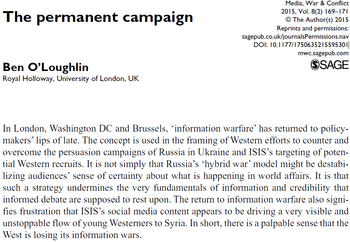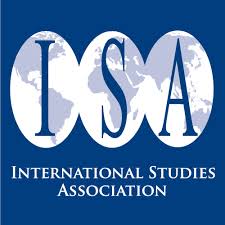 Please see details below of a special one-day conference before the 2016 ISA Annual Conference, organized by the International Communication Section of ISA:
Please see details below of a special one-day conference before the 2016 ISA Annual Conference, organized by the International Communication Section of ISA:
Conference Title: Communication, Peace and Security in the 21st Century
Date: March 15, 2016
Location: Atlanta GA, USA
Abstract deadline: October 16, 2015
Description:
Two overlapping trends highlight the first decade and a half of the 21st Century: information abundance and the growing ubiquity of mobile communication devices. While it is often claimed that these developments have facilitated political uprisings and revolutions, there is much debate over whether they have increased the world’s peace and security. This conference explores this important question at the international, state and individual levels.
Confirmed speakers: Professors Robert Entman, Steven Livingston and Phillip Seib.
Submission instructions:
Panel and paper submission welcome.
Please submit the following information in your submission:
1) Panel or paper title
2) Name of participant(s), institutional affiliation(s) and email(s)
3) Abstract (300-word limit)
Submission should be sent by email to icommconference@gmail.com
Registration is free for ICOMM section members.
Conference acceptances, full program and registration information will be sent out October 30th.
Please send any questions to icommconference@gmail.com
O'Loughlin to speak on surveillance at King's College London today
Today Ben O'Loughlin will speak at a workshop at King's College London, Visible Mediations of Transparency: Changing Norms & Practices. The hosts for this seminar are Dr Clare Birchall and Dr. Vian Bakir.This is the fourth of six seminars in the ESRC-funded DATA-PSST! seminar series. The programme is here. For those in the area it is not too late to join: 10 September 2015, 10am to 5pm Somerset House East Wing, SW1.09, King’s College London, The Strand.
Ben's position paper is based on work he is conducting with Andrew Hoskins on The Right Not to Know. An abstract is here:
Andrew Hoskins and I argue that the convergence of two shifts, one in the connective politics of conflict and catastrophe, the other in the connectivity of self, together generate the impossibility of claiming ignorance. A few weeks ago an open letter from a Syrian village was posted on Twitter in English: "[The] Assad regime is killing us and destroying our city. You are all responsible for our death. Your silence is keeping him strong”. Crisis mapping, satellite surveillance, citizen and professional news reporting, NGO reporting: the Syrian villagers assume we see and we know. Surveillance and sousveillance are conditions of this impossibility of ignorance. This impossibility is a defining challenge of the digital age partly because it manifests itself across the levels of real world politics, culture, technology and self – an entire ecology of knowing – that are often seen and treated as disconnected (and thus hived off for abstract enquiry). This is not the same as the right to be forgotten or the right to connect. A response requires something greater than the sum of these parts, hence we are asking what would a right not to know – notably a right that was not required of earlier media ecologies – look like?
O'Loughlin talking #trolls @NATO dialogue Perception Matters, Riga #RigaStratCom
 Ben O'Loughlin will speak this week at the Riga Stratcom Dialogue: Perception Matters, held on August 20th-21st in Riga, Latvia. He will discuss a project led by the Latvian Institute of International Affairs called 'Social Media as a weapon in the context of hybrid warfare'. In particular, Ben will discuss NATO members' efforts to identify and counter Russia's 'troll army' in the ongoing contest for public opinion in the region. Ben's work on global media events and Latvia's strategic communication researchers have both identified 'hybrid trolling' as an important feature of today's communication environment, but it may be that they draw very different conclusions from their studies.
Ben O'Loughlin will speak this week at the Riga Stratcom Dialogue: Perception Matters, held on August 20th-21st in Riga, Latvia. He will discuss a project led by the Latvian Institute of International Affairs called 'Social Media as a weapon in the context of hybrid warfare'. In particular, Ben will discuss NATO members' efforts to identify and counter Russia's 'troll army' in the ongoing contest for public opinion in the region. Ben's work on global media events and Latvia's strategic communication researchers have both identified 'hybrid trolling' as an important feature of today's communication environment, but it may be that they draw very different conclusions from their studies.
Other speakers include the President of Latvia, Raimonds Vējonis, and the Prime Minister, Laimdota Straujuma, NATO's Deputy Assistant Secretary General James Appathurai, former BBC World presenter Nik Gowing, and numerous military policymakers in the area of strategic communications.
Awan to address the United Nations Global Forum on Youth, Peace and Security in Amman
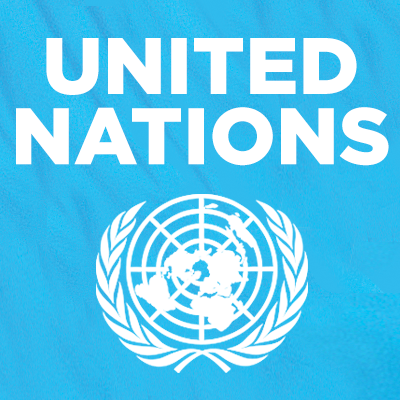
This week, Dr Akil Awan will be addressing the United Nations Global Forum on Youth, Peace and Security, and will be hosted by the Hashemite Kingdom of Jordan under the Patronage of His Royal Highness Crown Prince Al Hussein bin Abdullah II.The high profile event is envisaged to be the first gathering of this kind in history, signifying an important turning point towards a new international agenda on youth, peace and security.
Hoskins and O'Loughlin new in iCS: Arrested War: The Third Phase of Mediatization
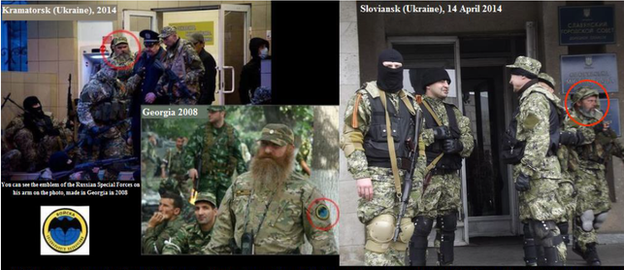 The 'little green men' Russia sent to Ukraine - part of new games of visibility that mark Arrested War. Image from France24.Andrew Hoskins and Ben O'Loughlin have published a new article in the journal Information, Communication & Society entitled Arrested War: The Third Phase of Mediatization. Please find the abstract below. The authors wish to thank Brian Loader and Holly Steel for publishing the article.
The 'little green men' Russia sent to Ukraine - part of new games of visibility that mark Arrested War. Image from France24.Andrew Hoskins and Ben O'Loughlin have published a new article in the journal Information, Communication & Society entitled Arrested War: The Third Phase of Mediatization. Please find the abstract below. The authors wish to thank Brian Loader and Holly Steel for publishing the article.
Abstract
Two new articles on Italy's Five Star Movement coauthored by Vaccari
 New Political Communication Unit researcher Cristian Vaccari has two book chapters out, coauthored with Lorenzo Mosca (Scuola Normale Superiore) and Augusto Valeriani (University of Bologna) examining the role and use of digital media by Italy's Five Star Movement, a new political party that took Italian politics by storm by coming second in both the 2013 general elections and the 2014 European Parliament elections.
New Political Communication Unit researcher Cristian Vaccari has two book chapters out, coauthored with Lorenzo Mosca (Scuola Normale Superiore) and Augusto Valeriani (University of Bologna) examining the role and use of digital media by Italy's Five Star Movement, a new political party that took Italian politics by storm by coming second in both the 2013 general elections and the 2014 European Parliament elections.
The first contribution is part of a book edited by Filippo Tronconi (University of Bologna) and titled Beppe Grillo's Five Star Movement: Organisation, Communication and Ideology, published by Ashgate. The chapter by Mosca, Vaccari and Valeriani examines the role of digital media for the Five Star Movement as a tool for organization, communication, and identity-building.
The second chapter is part of a book edited by Andrea De Petris (LUISS University) and Thomas Poguntke (University of Dusseldorf) and titled Anti-Party Parties in Germany and Italy: Protest Movements and Parliamentary Democracy, published by LUISS University Press. The chpater coauthored by Mosca, Vaccari and Valeriani focuses in particular on the first-in-their-kind online primaires that the Five Star Movement organized to select its candidates for the 2013 parliamentary elections.
O'Loughlin editorial The Permanent Campaign
In the latest issue of Media, War & Conflict, Ben O'Loughlin's editorial 'The Permanent Campaign' considers whether Western states' efforts to use public diplomacy in international conflicts undermines the purpose and effectiveness of public diplomacy itself. Read it here.
New Article on Text Mining and Social Media by Ampofo, Collister, O'Loughlin and Chadwick
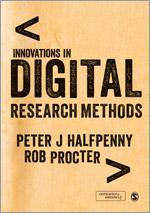 Newpolcom researchers Lawrence Ampofo, Simon Collister, and Ben O’Loughlin have a new article out examining the implications of text mining for social scientists.
Newpolcom researchers Lawrence Ampofo, Simon Collister, and Ben O’Loughlin have a new article out examining the implications of text mining for social scientists.
The chapter was commissioned by Peter Halfpenny and Rob Procter for their edited volume Innovations in Digital Research Methods, which has just been published by Sage.
A pre-publication version of the chapter was released as a New Political Communication Unit Working Paper.
Aslan article on Syria, activism & ICT published in International Journal of Communication #IJOC
 Via @ZainSyrBillur Aslan has published a new article in the International Journal of Communication, entitled The Mobilization Process of Syria’s Activists: The Symbiotic Relationship Between the Use of Information and Communication Technologies and the Political Culture. This is based on research she is conducting for her PhD thesis comparing activists' use of new media technologies in Egypt and Syria. The journal is ranked #8 for communications journals and is open access, so the article is free for anyone to read. Billur's abstract is below.
Via @ZainSyrBillur Aslan has published a new article in the International Journal of Communication, entitled The Mobilization Process of Syria’s Activists: The Symbiotic Relationship Between the Use of Information and Communication Technologies and the Political Culture. This is based on research she is conducting for her PhD thesis comparing activists' use of new media technologies in Egypt and Syria. The journal is ranked #8 for communications journals and is open access, so the article is free for anyone to read. Billur's abstract is below.
Abstract
Using extensive interviews of Syrian activists and tracing the course of initially peaceful protests, this article explores the mobilization tactics protesters adopted over four distinct phases of Syrian protests up to August 2011. Analysis reveals that in establishing trustful relations and a sense of effectiveness and belonging among the protesters, interpersonal communication was more effective and faster than the hybrid media activities of Facebook administrators. Nevertheless, the uprising’s later stages show that the more protesters became accustomed to protest culture, the more they benefited from ICTs. Many scholars studying ICTs’ role in the protests have advanced the idea that people’s use of the technology—not the technology itself—affected social processes. This study takes this argument a step further to claim that people’s use of technology constitutes a dependent variable linked to the country’s political culture.
Workshop on Digital Media, Power, and Democracy in Election Campaigns, Washington DC, July 1-3
Andrew Chadwick and Jennifer Stromer-Galley (Syracuse University) are running a workshop on Digital Media, Power, and Democracy in Election Campaigns next week in Washington DC.
The workshop has been nine months in the making and it is part of the preparation for a special issue of the International Journal of Press/Politics, to be edited by Andrew and Jennifer. This is not an open workshop; it is by invitation only.
The uprisings in Eastern Europe and the Middle East have focused attention on the question of digital media and political power. This has resulted in a wave of research on the relationships between technological change, mobilization, and revolutionary activism in authoritarian and semi-democratic political contexts.
While this research has generated important insights, we suggest that it should now be joined by fresh analysis of the role of digital media in election campaigns. We call for papers for a special issue of the International Journal of Press/Politics that are international or comparative in orientation, that present new evidence, and that connect the study of digital media explicitly with questions concerning power and democracy. We invite authors to examine established democracies both in and beyond the United States and Europe, and in emerging and what comparative regime theorists have termed “difficult democracies” across the world.
Central to the political life of all types of democracies are the organizations, practices, and media technologies of election campaigns, yet we know surprisingly little about the changes that have occurred in this field over recent years. We invite submissions that explore what we see as the increasingly contested issue of the balance of power between political elites, digital media actors, and citizens in election campaigning. Our aim is to orient this project around two classical and fruitfully contested concepts: power and democracy.
We seek submissions that explore continuity and change in the power relations that shape campaigns. We conceive of these power relations in three principal ways. First, we see a need to focus on the internal communication structures of party and campaign organizations. Second, scholars may focus on power relations in the communication flows between party and campaign organizations and the wider constellation of organizations within which citizen participation now occurs. Third, papers may examine the interactions between ordinary citizens and party and campaign organizations.
We primarily seek papers that advance empirical knowledge. Undergirding our interest in these themes, however, is intense normative curiosity about the potential democratizing effects of digital media, not only in relatively “settled” liberal-democratic contexts but also in the globally important difficult-democratic cases that increasingly inform thinking about real-world democracy, such as, for example, Brazil, India, Russia, Mexico, Singapore, Egypt, Turkey, Tunisia, the Balkan states, and parts of central and eastern Europe. Our concern with the difficult democracies emerges because it could be the case that in these political systems important power shifts are more likely.
We would like authors to directly address the question of whether the adoption of digital media is increasing citizens’ influence over the hierarchical organizational structures that have typically dominated parties and election campaigns since the rise of the mass broadcast era. We also want authors to think about conditionality: the balance of forces and causes that shape whether changes in mediated campaigning are democratizing or not democratizing in their effects.
We have no orthodoxy regarding data and methods. We foresee a range of approaches: single country and comparative studies; papers adopting methods of big data analysis; those adopting quantitative approaches; and those situated within qualitative and ethnographic traditions.
Participation in the workshop is not mandatory for consideration for the IJPP special issue. A call for papers for the special issue will follow shortly.
For details of the workshop and to download a paper list, please visit the workshop website here.

